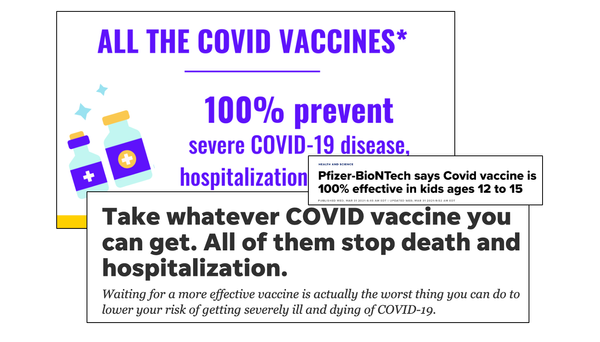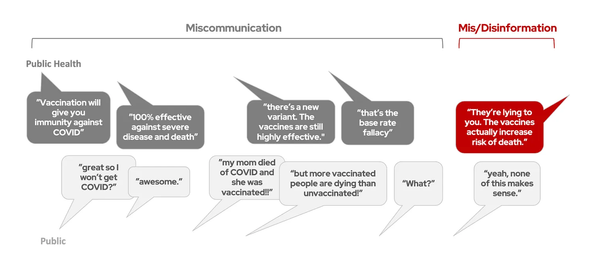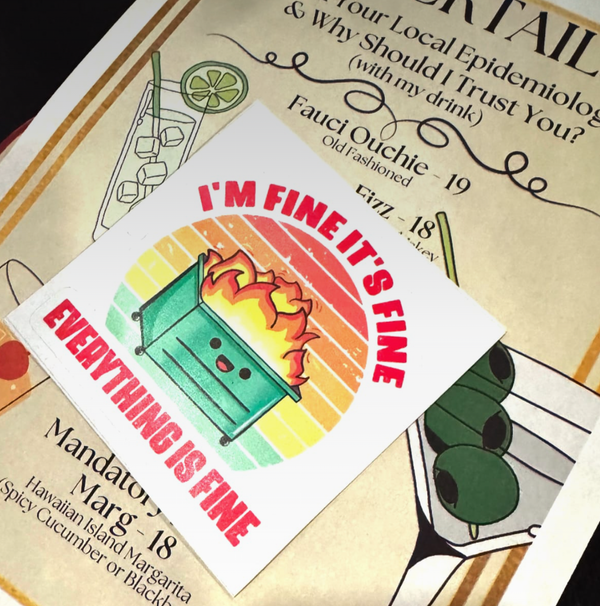What is MD-PhD training (and why am I still a student?)
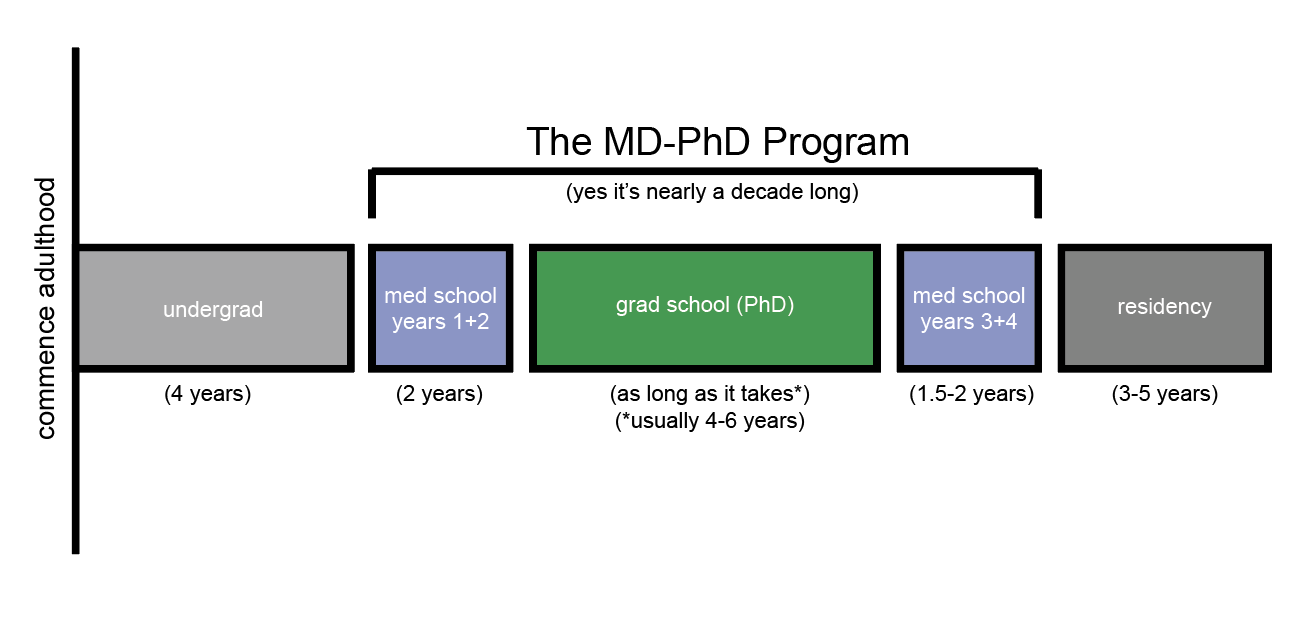
Hello!!! It has been a little while since I’ve written anything as I have OFFICIALLY GRADUATED WITH MY PHD!!!! (And am now back in medical school). You may now call me Dr. Panthagani.
While more COVID science explanatory goodness will be coming soon, I thought I’d write a quick post explaining what it is I do, as I hope that this pandemic has shown the importance of science and medicine and maybe has inspired a few students to pursue careers in biomedical research. While most people are familiar with medical school, I have found that many people are confused about what MD-PhD training actually is, why it takes so long, and why it’s worth doing. So here it goes: what exactly is an MD-PhD program and why, despite being in school my entire life, do I find myself in my 30’s but am stilllllll a student?
Very simply, an MD-PhD program is a combined program where you do both medical school (the MD part) and graduate school (the PhD part). Neither of those are shortened beyond the standard time it takes to do them individually, so MD-PhD programs are quite long (8-9 years). A 4-year undergraduate degree is required to apply, so all together (if you don’t take any breaks), it’s 12-13 years of post-secondary education, not including residency.
When I moved to Texas to start my program (waaaay back in 2012), most of my friends didn’t really understand what I was doing, so at my going away party I drew out this diagram (like the nerd that I am.)

Why on earth would anyone sign up for this? A fair question. The reason these programs exist is to train people to become physician-scientists: people who have two very different skill sets in the same brain:
1. how to take care of patients (the MD part) and
2. how to do scientific research (the PhD part)
While deeply interconnected, the jobs of science and medicine are very different. While medical school provides some training in how to evaluate medical studies, the majority of the time is spent learning the details of all the different diseases, how to take patient histories and do physical exams, how to navigate hospitals and clinics, and how to take care of real breathing patients. Learning how to do scientific research and design experiments is not at all the focus of medical school. Contrast that with graduate school, where all you do all day every day is scientific experiments. There are no patients to care for, only test tubes, data analysis, and the broken hearts of crushed hypotheses. By the end of medical school, you have a good idea how to take care of patients (well… sort of, you really hone that in residency). By the end of graduate school, you know how to do a major scientific study.
Simplifying this to meme format, this is med school:
And this is grad school….
— Nathan W. Pyle (@nathanwpyle) September 25, 2019
So where am I on this road of endless studentship? I am 8 years in (12 years including college). I did a bachelors in Chemistry, then the first two years of med school, then went to grad school for 6 years and just finished my PhD, and am now back in med school to finish it up. Then, on to residency.
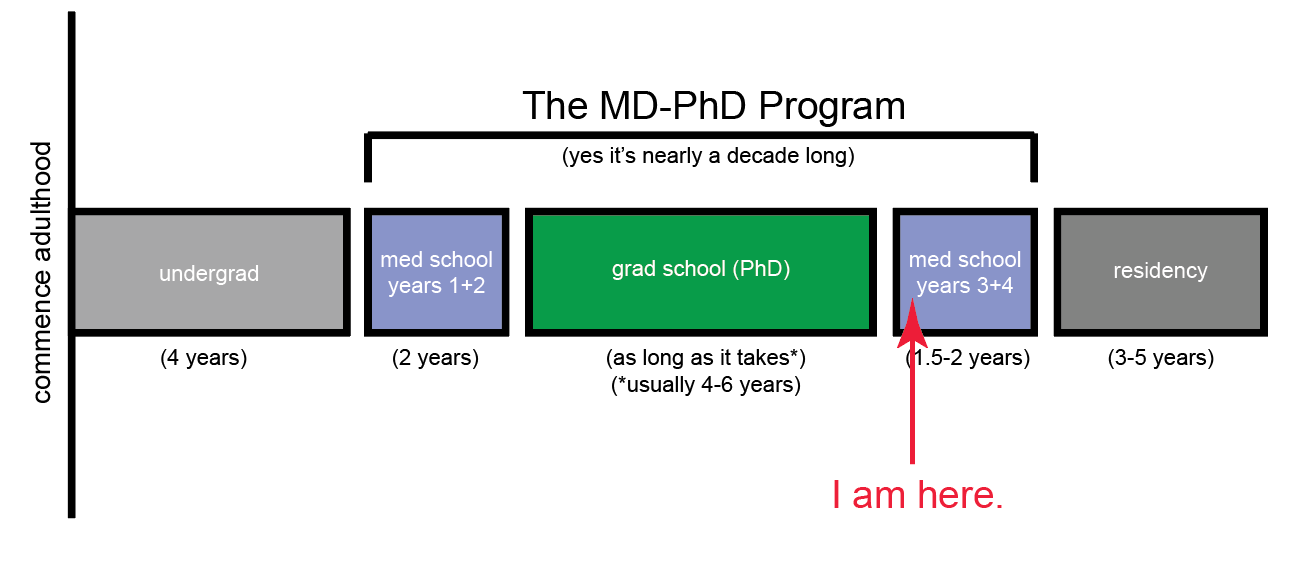
So, why do MD-PhD programs exist? Why would somebody need to learn how to do both medicine and scientific research? Isn’t one enough? Well, yes. It’s not like everyone needs to do both, but there are some advantages to having both of those skill sets in the same person. For people who want to do medical research, a deep understanding of the details of how to do research is obviously essential (study design, appropriate controls, appropriate statistics, etc.), but it is also very helpful to have a broad understanding of medicine, a deep clinical understanding of the disease that they’re studying, and also knowledge of more practical things like the details of how hospitals work and what’s feasible from a patient’s perspective, etc. That’s where the MD part comes in. The idea is that by having a foot in both the hospital and the laboratory, physician-scientists can more rapidly bring medical questions to the laboratory and study them, and also more rapidly bring medical breakthroughs from the laboratory back to the hospital. How often that works in real life I’m not sure, but I can tell you that having training in both sure does help me understand what research questions are important and what therapeutics might actually be feasible.
Now some caveats before I offend a bunch of people: having both degrees is not essential; you can gain these skills in other ways. There are many MD’s who do medical research without a PhD and many PhD’s who do medical research without an MD. The idea behind the MD-PhD programs is that they are a (relatively) streamlined way to get students to the place where they have both skill sets. (Another advantage is that many come with a full-ride scholarship, which means graduates aren’t burdened by medical school debt when they’re done and are thus free to take lower paying research jobs.)
When I was trying to decide whether or not to apply to MD-PhD programs after college, I scoured the internet looking for helpful advice, and didn’t find much to be honest. So if you’re reading this trying to figure out if this career path is right for you, here are the thoughts of someone 85% through.
- A lot of people go into these programs simply because they’re indecisive and couldn’t pick between med school and research. That’s ok. If you genuinely like both, just do both.
- I remember one piece of advice I read was something like “you know the physician-scientist path is right for you if you can’t imagine doing anything else.” I think that’s terrible advice. I could be happy doing a lot of things, I just chose this one. Don’t feel like you have to have some grand sense of calling to this career path; just do it if you want to do it. In fact, it is very helpful if your identity is not wrapped up in your education/career, otherwise you may feel like you’re failing at your life’s grand purpose when you encounter academic challenges (which will happen). Having your success as a human being wrapped up in your score on your first med school exam is quite a load to carry; I don’t recommend it.
- You very much need to be ok with delayed gratification. It is a long training path, and nearly everyone thinks about quitting at some point (for me it was every other month for the first four years). Perseverance is a must.
- My dad, who did his PhD in wind tunnels, gave me a very useful piece of advice before I started… he said PhD training is like going through a long tunnel, and there is a big chunk in the middle where you can’t see the light at the beginning nor can you see the light at the end, and it feels like the darkness will go on forever. This is very, very true. It does feel that way. So just know that going in, and decide if you want to deal with that. It is hard, but it is worth it.
- Don’t worry about the fact that you’ll be in your 30’s when you graduate. I remember this seemed like a really big deal when I started. As a college kid that feels like an eternity and like you can’t start your life until you’re “done with school.” That’s just not true. Another great piece of advice I got when I started was that no matter what I do, I’ll be in my 30’s in 8 years, so the question is really whether or not I’d like to have two doctoral degrees when I get there? I decided yes. Your 30’s are coming whether you like it or not, so just decide what you want to do with the time you have between now and then.
- One of the ways pre-med students are encouraged to explore a career in medicine is by shadowing physicians. However, if you don’t really enjoy shadowing doctors, don’t sweat it. I shadowed several doctors and to be honest found it very boring, because I didn’t yet have the skills to be helpful, and I hate standing around doing nothing. I remember wondering if this was a sign that I shouldn’t be a doctor. If you found this too, don’t count yourself out. If you’re thinking about becoming a doctor and you like to study, learn, and serve, don’t overthink it too much. It’s a job where you can do those things. There are other jobs where you can do those things too. Again, this isn’t your destiny, it’s your occupation. Just commit to one, and go for it.
- If you don’t like research, don’t do a PhD. It’s not worth it. Yes the MD-PhD scholarships are tantalizing, but remember that those who don’t do a PhD start earning a physician’s salary 4-5 years earlier, which if you compare to the 30k stipend you’ll get in grad school, is a much better deal. So only do the PhD if you actually want to do it; don’t do it for the med school scholarship.
- My MD-PhD road has been pretty rough, but I can honestly say I’m really glad I did it. I’m a person who likes science, serving people, and taking on very big challenges. If that describes you, go for it.

